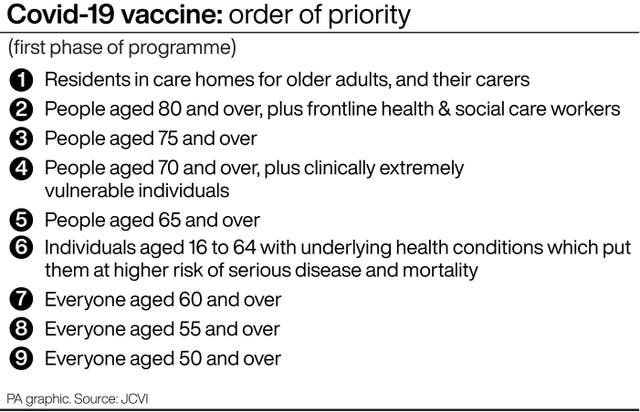Teachers to be considered as possible priority for vaccine
Labour leader Sir Keir Starmer said opening classrooms again did not need to be contingent on vaccinating teachers.

Teachers will be considered as a possible priority for the next phase of the coronavirus vaccine roll-out, a Joint Committee on Vaccination and Immunisation (JCVI) member has said.
Professor Adam Finn said committee members had been instructed to come up with a plan by the middle of February to determine the priority order of who should be vaccinated next.
He told Sky News’ Sophy Ridge On Sunday programme that while he could not predict what will be prioritised, the “critical role” teachers play “really will figure in the discussions”.

The professor of paediatrics at the University of Bristol said: “As you can appreciate these considerations start to be social values in a way more than the criteria we normally use, which is pressure on the health service.”
Asked about the position of teachers on the priority list, he said: “I can’t predict exactly what will be prioritised but I can say that we will be discussing this and coming up with a plan, and I can also say that when it comes to teachers I think we all appreciate the critical role that they all play and so that really will figure in the discussions.”
It comes as the NASUWT teachers’ union said too many children were returning to school despite the national lockdown, resulting in a high risk of the virus being transmitted.
Primary and secondary schools in England have moved to remote learning for most pupils, but remain open for the children of key workers and those deemed vulnerable.
Health Secretary Matt Hancock told Sky News: “It’s always been the guidance that schools are there for key workers’ children where key workers need to have the children in school in order to be able to get to work.”
He added: “For instance, if you’re a key worker and your partner doesn’t work then you shouldn’t be sending your children to school. That’s clear in the guidance. But of course the reason that we keep schools open for key workers’ children is that this is important.

“It is important – for instance – that key workers in the NHS but not just the NHS – can get to work and so it’s a very difficult balance to strike.”
Labour leader Sir Keir Starmer said delivering on the vaccine programme targets was the best way of reopening schools.
But he told BBC One’s Andrew Marr Show that opening classrooms again did not need to be contingent on vaccinating teachers.
Pressed on whether reopening was contingent on inoculating teachers, he said: “No, I don’t know that it necessarily is, although if that can happen that would be a good thing.
“This argument that there are sectors where there is a very strong case for vaccination for obvious reasons, and I understand that and we are going to have to accommodate that, quite frankly.
“But at the moment, we do need to focus on those who are most likely to go into hospital and tragically to die.”

Top of the current vaccine priority list are people who live and work in care homes, followed by people over the age of 80 and frontline health and social care workers – including NHS staff.
Next on the list are people over the age 75, and the fourth group are people aged over 70 and those classed as clinically extremely vulnerable.
This last group – who are the same as those who have been advised to shield – includes people such as organ transplant recipients and cancer patients.
The next group are those aged 65 and over, followed by people aged 16 to 64 with underlying health conditions that put them at higher risk of serious disease or death.
People over the age of 60 will be next in line, followed by those over 55 and then over 50.





